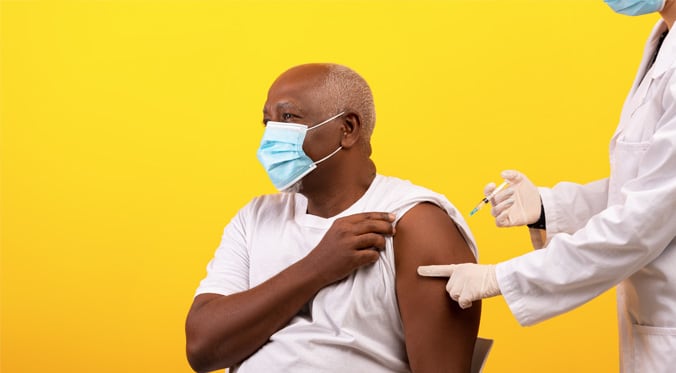Should You Get a COVID-19 Vaccine Booster?

With COVID-19 cases currently rising in many states and the emergence of the new omicron variant, many people are wondering whether they should get a vaccine booster. Research suggests that for people with cancer, the answer is yes.
A recent research letter published in the scientific journal JAMA Oncology reported that patients with solid tumors undergoing cancer treatment who received a booster of the Pfizer-BioNTech vaccine had a significant, robust immune response. Many patients saw their antibody levels increase two- or three-fold, or more. Another study of 88 patients with cancer who received booster shots supported these findings. The authors noted that while anti-COVID-19 immunity did wane significantly 4–6 months after the initial vaccine series, immunity can be “rescued” to above pre-vaccination levels after booster vaccination. Of note, the majority of the patients in this study had blood cancers such as leukemia, so we can’t say for sure exactly how it applies for patients with prostate cancer. Finally, this study of more than 1.4 million people in Israel showed that a third dose of the Pfizer-BioNTech vaccine greatly reduced the chance of hospitalization, severe COVID, and COVID-related death in the general population—which included people with cancer and chronic illnesses—compared with just 2 doses.
The CDC now recommends that everyone aged 18 and older should get a booster at least 6 months after their 2nd dose of the Moderna or Pfizer-BioNTech vaccine, or 2 months after a single dose of the Johnson & Johnson vaccine. While the vaccines do protect against severe disease, their effectiveness in people over age 65 and in preventing milder disease with symptoms decreases over time. Make sure to consult your doctor about your personal health condition.
What about the omicron variant? Initial vaccines and boosters are still important tools. Even if omicron can evade some of the antibodies produced in response to your initial vaccine, “topping up” your antibody levels by getting a booster at the recommended time can make up for that to some extent. And your immune system continues to “learn” following vaccination, creating more effective virus-fighting antibodies.
If you haven’t gotten your first vaccine dose yet, it’s not too late! The CDC notes that for people with underlying medical conditions—including cancer, diabetes, and heart disease—vaccination is key to preventing severe illness. People with these conditions are more likely to have worse outcomes if they develop COVID-19, such as hospitalization, need for a ventilator, and even death. If you have a chronic illness, talk to your doctor about how best to protect yourself.










